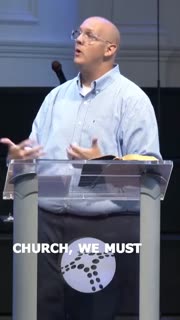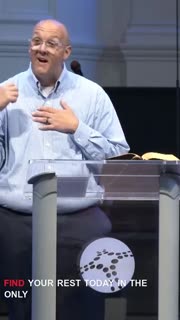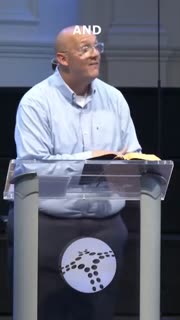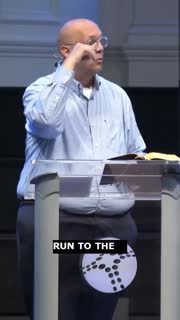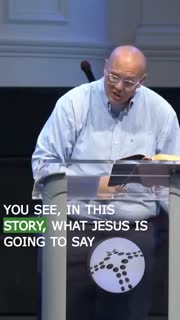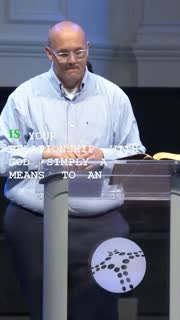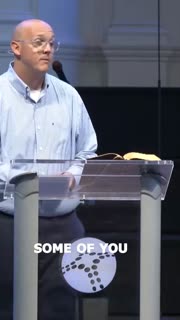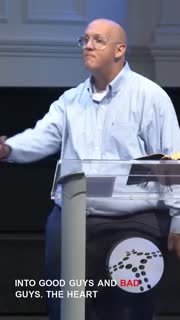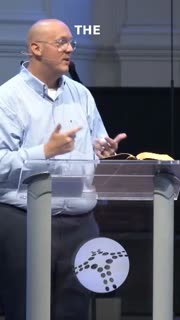God's Heart for the Lost: A Call to Repentance
Summary
### Summary
In Luke 15, Jesus tells three parables that reveal the heart of God towards the lost and the self-righteous. The first two parables, the lost sheep and the lost coin, illustrate the joy in heaven over one sinner who repents. The shepherd and the woman diligently search for what is lost, and upon finding it, they celebrate with their community. This sets the stage for the third parable, often called the Parable of the Prodigal Son, but more accurately described as the Parable of the Two Lost Sons.
The younger son, representing the blatant sinners, demands his inheritance, essentially wishing his father dead. He squanders it in reckless living, only to find himself destitute and longing for the pig's food. In his lowest moment, he remembers his father's goodness and decides to return home, hoping to be accepted as a servant. However, his father sees him from afar, runs to him, and restores him to sonship with a robe, a ring, and a celebration. This act of grace shows that God's love and forgiveness are greater than any sin.
The elder son, representing the self-righteous Pharisees, is angry and refuses to join the celebration. He feels entitled to his father's blessings because of his obedience and hard work. The father gently entreats him to join the celebration, reminding him that everything the father has is already his. This highlights that both the wayward and the self-righteous are lost and need reconciliation with the father.
The parable ends on a cliffhanger, leaving us to ponder whether the elder son will join the celebration. This open-ended conclusion invites us to examine our own hearts. Are we like the younger son, needing to repent from blatant sin, or like the elder son, needing to repent from self-righteousness? The call is the same for both: run to the Father, who is enough and offers true satisfaction, rest, and joy.
### Key Takeaways
1. God's Pursuit of the Lost: The parables of the lost sheep and the lost coin illustrate God's relentless pursuit of those who are lost. He searches diligently and rejoices greatly when one sinner repents. This shows that no one is too far gone for God's grace. [35:43]
2. The Younger Son's Journey: The younger son's journey from rebellion to repentance highlights the emptiness of a life lived apart from God. True freedom and fulfillment are found only in a relationship with the Father. His return and the father's joyful reception illustrate the boundless grace and forgiveness available to all who repent. [42:50]
3. The Elder Son's Struggle: The elder son's anger and refusal to join the celebration reveal the dangers of self-righteousness. He obeyed the rules but missed the heart of the father. This teaches us that outward obedience without a heart of love and grace can alienate us from God just as much as blatant sin. [51:57]
4. The Heart of the Father: The father's actions towards both sons reveal his loving and gracious heart. He runs to the younger son, embracing him despite his filth, and gently entreats the elder son to join the celebration. This shows that God desires a relationship with us, not just our obedience. [59:30]
5. The Call to Repentance: Both the wayward and the self-righteous are called to repentance. The younger son repents from his blatant sins, while the elder son needs to repent from his pride and self-righteousness. True reconciliation with God comes through recognizing our need for His grace and running to Him. [01:04:10]
### YouTube Chapters
[0:00] - Welcome
[29:42] - Near-Death Experiences
[30:11] - Lil Wayne's Theology
[31:22] - Two Mindsets
[32:44] - Context of Luke 15
[34:13] - The Two Groups
[35:43] - The Lost Sheep and Coin
[37:03] - Celebrating the Found
[38:28] - The Two Lost Sons
[39:50] - The Younger Son's Request
[41:18] - The Younger Son's Reckless Living
[42:50] - The Younger Son's Desperation
[44:23] - Coming to His Senses
[45:42] - The Father's Compassion
[47:15] - The Father's Embrace
[48:46] - Restored to Sonship
[50:26] - The Elder Son's Anger
[51:57] - The Elder Son's Refusal
[53:22] - The Father's Entreaty
[54:54] - The Elder Brother's Heart
[56:19] - The Danger of Self-Righteousness
[58:05] - The Call to Repentance
[59:30] - The Father's Gentle Appeal
[01:01:05] - The Heart of the Father
[01:02:44] - The True Elder Brother
[01:04:10] - Run to the Father
[01:05:55] - Closing Prayer
Study Guide
### Bible Reading
1. Luke 15:1-32 - The Parables of the Lost Sheep, the Lost Coin, and the Prodigal Son
2. Isaiah 61:10 - "I will greatly rejoice in the Lord; my soul shall exult in my God, for he has clothed me with the garments of salvation; he has covered me with the robe of righteousness."
### Observation Questions
1. What actions do the shepherd and the woman take when they lose the sheep and the coin, respectively? How do they react upon finding them? ([35:43])
2. Describe the younger son's journey from rebellion to repentance. What prompts him to return to his father? ([42:50])
3. How does the father respond when he sees the younger son returning home? What does he do to restore him? ([47:15])
4. What is the elder son's reaction to the celebration for his younger brother's return? How does the father address his concerns? ([51:57])
### Interpretation Questions
1. What do the actions of the shepherd and the woman in the first two parables reveal about God's attitude towards the lost? ([35:43])
2. How does the younger son's realization of his father's goodness influence his decision to return home? What does this teach us about repentance? ([44:23])
3. In what ways does the elder son's response to his brother's return highlight the dangers of self-righteousness? How does this compare to the Pharisees' attitude towards sinners? ([51:57])
4. How does the father's response to both sons illustrate the heart of God? What does this tell us about God's desire for relationship over mere obedience? ([59:30])
### Application Questions
1. Reflect on a time when you felt lost or distant from God. How did you experience His pursuit and grace in that situation? ([35:43])
2. The younger son had to come to his senses and remember his father's goodness before he could repent. Is there an area in your life where you need to "come to your senses" and turn back to God? ([44:23])
3. The elder son struggled with self-righteousness and entitlement. Do you see any areas in your life where you might be relying on your own righteousness rather than God's grace? How can you address this? ([51:57])
4. The father in the parable shows unconditional love and forgiveness. How can you emulate this kind of love in your relationships, especially with those who have wronged you? ([47:15])
5. Both sons needed reconciliation with their father. Are there relationships in your life that need reconciliation? What steps can you take to initiate that process? ([59:30])
6. The parable ends on a cliffhanger regarding the elder son's decision. How does this open-ended conclusion challenge you to examine your own heart and response to God's invitation? ([53:22])
7. The father reminds the elder son that everything he has is already his. How can you cultivate a heart of gratitude for the blessings you already have, rather than focusing on what you feel you lack? ([59:30])
Devotional
Day 1: God's Relentless Pursuit
God's Pursuit of the Lost: The parables of the lost sheep and the lost coin illustrate God's relentless pursuit of those who are lost. He searches diligently and rejoices greatly when one sinner repents. This shows that no one is too far gone for God's grace. [35:43]
In Luke 15, Jesus shares the parables of the lost sheep and the lost coin to illustrate the heart of God towards those who are lost. The shepherd leaves the ninety-nine sheep to find the one that is lost, and the woman searches diligently for her lost coin. Both parables culminate in a celebration when what was lost is found. This imagery powerfully conveys God's relentless pursuit of each individual. He does not give up on anyone, no matter how far they have strayed. The joy in heaven over one sinner who repents is immense, reflecting the value God places on every soul.
These parables remind us that God's grace is boundless and His love is unwavering. No one is beyond the reach of His mercy. Whether you feel lost due to your own actions or circumstances beyond your control, know that God is actively seeking you. He desires to bring you back into His fold and celebrate your return. This relentless pursuit is a testament to His incredible love and the joy that comes from reconciliation with Him.
Ezekiel 34:11-12 (ESV): "For thus says the Lord God: Behold, I, I myself will search for my sheep and will seek them out. As a shepherd seeks out his flock when he is among his sheep that have been scattered, so will I seek out my sheep, and I will rescue them from all places where they have been scattered on a day of clouds and thick darkness."
Reflection: Think of a time when you felt lost or distant from God. How did you experience His pursuit and grace in that season? How can you extend that same grace to someone in your life who may feel lost today?
Day 2: The Journey from Rebellion to Repentance
The Younger Son's Journey: The younger son's journey from rebellion to repentance highlights the emptiness of a life lived apart from God. True freedom and fulfillment are found only in a relationship with the Father. His return and the father's joyful reception illustrate the boundless grace and forgiveness available to all who repent. [42:50]
The younger son in the parable of the Prodigal Son represents those who live in blatant sin and rebellion against God. He demands his inheritance, leaves home, and squanders it in reckless living. This path leads him to a place of utter destitution, longing for the food of pigs. In his lowest moment, he remembers his father's goodness and decides to return home, not expecting to be received as a son but hoping to be accepted as a servant. However, his father sees him from afar, runs to him, and restores him to sonship with a robe, a ring, and a celebration.
This journey from rebellion to repentance highlights the emptiness and despair that come from living apart from God. True freedom and fulfillment are found only in a relationship with the Father. The father's joyful reception of the younger son illustrates the boundless grace and forgiveness available to all who repent. No matter how far we have strayed, God's love is greater than our sin, and He is always ready to welcome us back with open arms.
Isaiah 55:7 (ESV): "Let the wicked forsake his way, and the unrighteous man his thoughts; let him return to the Lord, that he may have compassion on him, and to our God, for he will abundantly pardon."
Reflection: Reflect on a time when you turned away from God and later repented. How did you experience His grace and forgiveness? What steps can you take today to deepen your relationship with the Father?
Day 3: The Dangers of Self-Righteousness
The Elder Son's Struggle: The elder son's anger and refusal to join the celebration reveal the dangers of self-righteousness. He obeyed the rules but missed the heart of the father. This teaches us that outward obedience without a heart of love and grace can alienate us from God just as much as blatant sin. [51:57]
The elder son in the parable of the Prodigal Son represents the self-righteous individuals who believe their obedience and hard work entitle them to the father's blessings. When his younger brother returns and is celebrated, the elder son becomes angry and refuses to join the celebration. He feels that his years of obedience and hard work have gone unnoticed and unappreciated. The father gently entreats him to join the celebration, reminding him that everything the father has is already his.
This struggle reveals the dangers of self-righteousness. The elder son obeyed the rules but missed the heart of the father. He was so focused on his own righteousness that he failed to understand the father's love and grace. This teaches us that outward obedience without a heart of love and grace can alienate us from God just as much as blatant sin. True relationship with God is not about earning His favor through our actions but about understanding and embracing His love and grace.
Matthew 23:27-28 (ESV): "Woe to you, scribes and Pharisees, hypocrites! For you are like whitewashed tombs, which outwardly appear beautiful, but within are full of dead people's bones and all uncleanness. So you also outwardly appear righteous to others, but within you are full of hypocrisy and lawlessness."
Reflection: Consider areas in your life where you may be relying on your own righteousness rather than God's grace. How can you shift your focus from outward obedience to cultivating a heart of love and grace?
Day 4: The Father's Loving Heart
The Heart of the Father: The father's actions towards both sons reveal his loving and gracious heart. He runs to the younger son, embracing him despite his filth, and gently entreats the elder son to join the celebration. This shows that God desires a relationship with us, not just our obedience. [59:30]
The father's actions in the parable of the Prodigal Son reveal his loving and gracious heart towards both of his sons. When the younger son returns home, the father sees him from afar, runs to him, and embraces him despite his filth. He restores him to sonship with a robe, a ring, and a celebration. This act of grace shows that the father's love and forgiveness are greater than any sin. He does not hold the younger son's past against him but rejoices in his return.
Similarly, the father gently entreats the elder son to join the celebration, reminding him that everything the father has is already his. The father's response to both sons highlights that he desires a relationship with them, not just their obedience. He longs for them to understand and embrace his love and grace. This reveals the heart of God towards us. He desires a relationship with us, not just our outward obedience. His love and grace are available to all, regardless of our past or our self-righteousness.
Psalm 103:13-14 (ESV): "As a father shows compassion to his children, so the Lord shows compassion to those who fear him. For he knows our frame; he remembers that we are dust."
Reflection: Reflect on how you have experienced God's love and grace in your life. How can you cultivate a deeper relationship with Him, focusing on His love rather than just outward obedience?
Day 5: The Call to Repentance
The Call to Repentance: Both the wayward and the self-righteous are called to repentance. The younger son repents from his blatant sins, while the elder son needs to repent from his pride and self-righteousness. True reconciliation with God comes through recognizing our need for His grace and running to Him. [01:04:10]
The parable of the Prodigal Son ends on a cliffhanger, leaving us to ponder whether the elder son will join the celebration. This open-ended conclusion invites us to examine our own hearts. Are we like the younger son, needing to repent from blatant sin, or like the elder son, needing to repent from self-righteousness? The call is the same for both: run to the Father, who is enough and offers true satisfaction, rest, and joy.
True reconciliation with God comes through recognizing our need for His grace and running to Him. The younger son repents from his blatant sins and is joyfully received by the father. The elder son, however, struggles with pride and self-righteousness, feeling entitled to the father's blessings because of his obedience and hard work. Both sons are lost in different ways and need reconciliation with the father. This parable teaches us that no matter our situation, we all need to repent and turn to God, who offers boundless grace and forgiveness.
Joel 2:12-13 (ESV): "Yet even now," declares the Lord, "return to me with all your heart, with fasting, with weeping, and with mourning; and rend your hearts and not your garments." Return to the Lord your God, for he is gracious and merciful, slow to anger, and abounding in steadfast love; and he relents over disaster."
Reflection: Examine your heart and identify areas where you need to repent, whether from blatant sin or self-righteousness. How can you run to the Father today and embrace His grace and forgiveness?
Quotes
### Quotes for Outreach
1. "Church, we must be celebrating with one another when those that are lost come to faith in Jesus Christ. That is our call. That's what Jesus is pointing us to here as he's saying this." [37:03] (12 seconds)
2. "Find your rest today in the only relationship that's ever going to satisfy a relationship with the father." [42:50] (7 seconds)
3. "God's love and his forgiveness is bigger than your sin and your shame. There's no sin that you can ever do that's going to discredit what Jesus did on the cross. You don't have to earn it. You just have to come to him in repentance." [48:46] (17 seconds)
4. "Run to the father. He is enough. He is truly satisfying. There is rest in him, joy in him. There is peace in him. He paid it all by giving up his son, Jesus, for you. You're not too lost for Jesus to find you. You're not too dirty in your sin for Jesus to cleanse you." [01:04:10] (25 seconds)
### Quotes for Members
1. "You see, in this story, what Jesus is going to say is that both the irreligious and the religious are spiritually lost on their own accord. So then Jesus begins to tell this parable. He tells three stories and it's all pointing to one point." [34:13] (19 seconds)
2. "Is your relationship with God simply a means to an end? Do you want God to answer all your prayers and give you his blessings? father's response is amazing. The listeners would expect the father to do what would have been okay in the custom, which was drive the son out of the family and out of the village, or even by the letter of the law could have stoned him to death for this request." [39:50] (28 seconds)
3. "Some of you guys have been running for a long time and you need to come to your senses and remember who your heavenly father is. This is what he does. And so he starts to come up with this plan. Verse 18 says, I'm going to arise. I'm going to go to my father and I'm going to say to him, father, I've sinned against heaven and against you. I'm no longer worthy to be called your son. Just treat me as one of your hired servants." [44:23] (22 seconds)
4. "The heart of the father doesn't divide us into good guys and bad guys, into elder brothers and younger brothers. You see, his gospel, it is not religious or irreligious. It's not moral or immoral. It's not Clemson or Carolina. It's not conservative or liberal. It's different altogether. It's everyone is wrong, everyone is loved, and everyone is called to recognize this and turn and run to the father. This is the call of the gospel." [01:01:05] (26 seconds)
5. "You see, what the father does in verse 20 and what he does in verse 28 is the same thing that he does here with you, is that the father pursues you. He may see you at a long way off because you're wayward in your sin and you know all the stuff that you're done, and he's not going to leave you out there. He's going to run after you." [58:05] (18 seconds)
